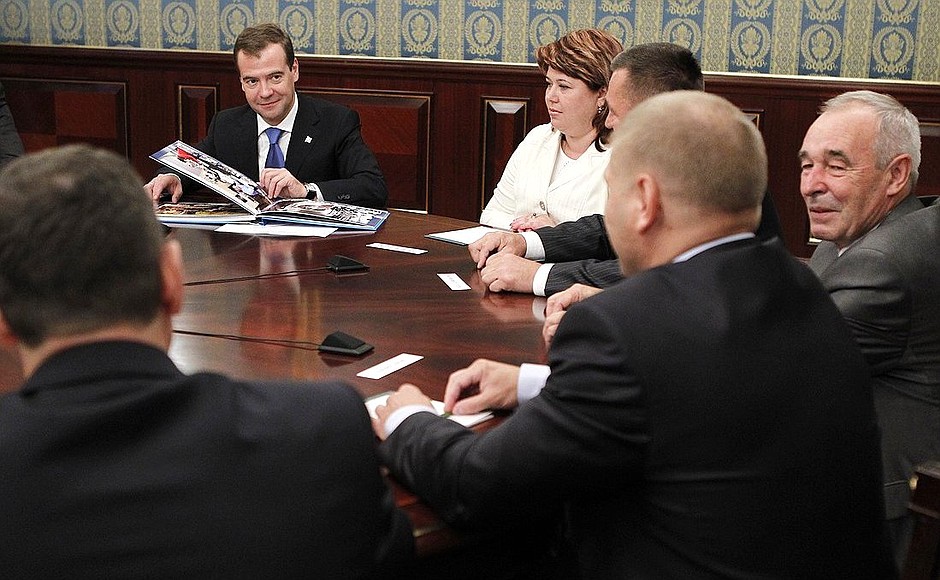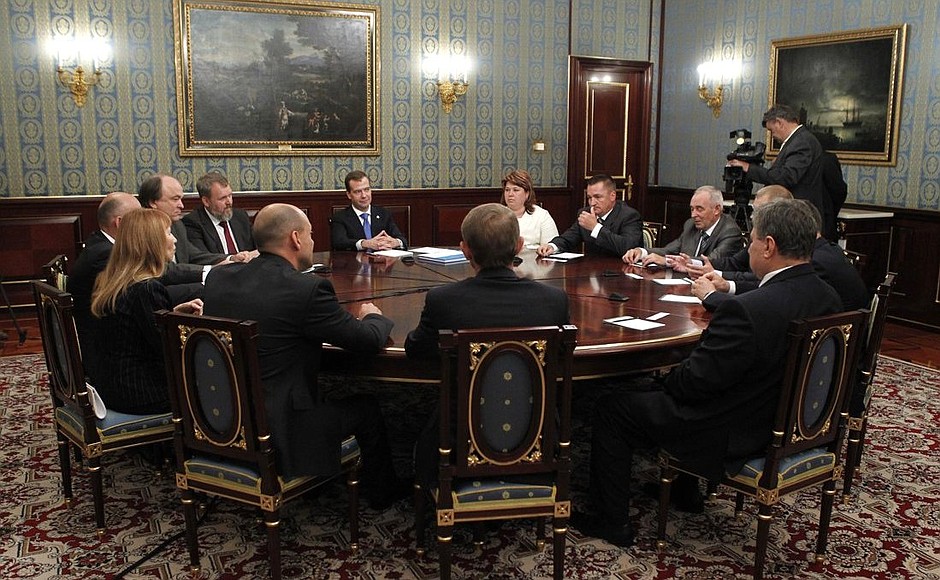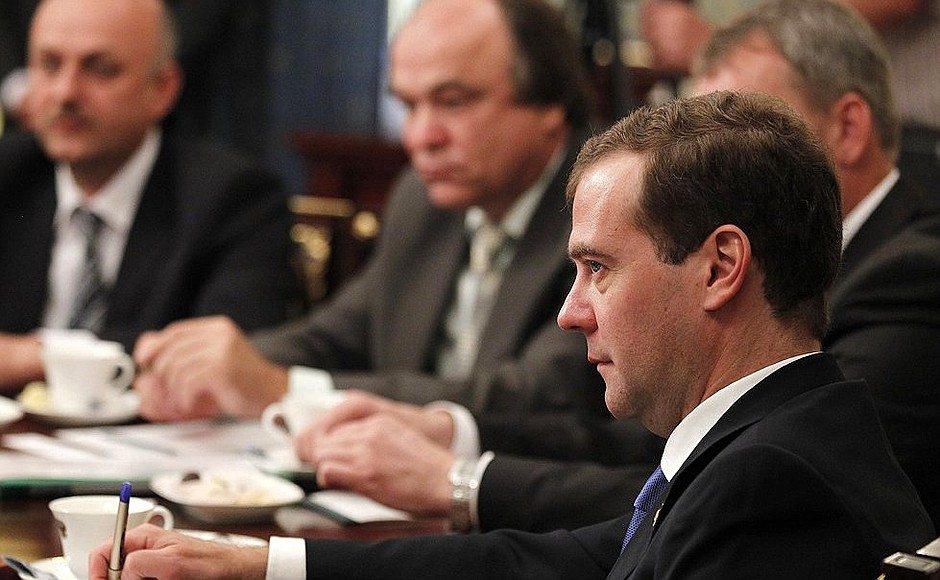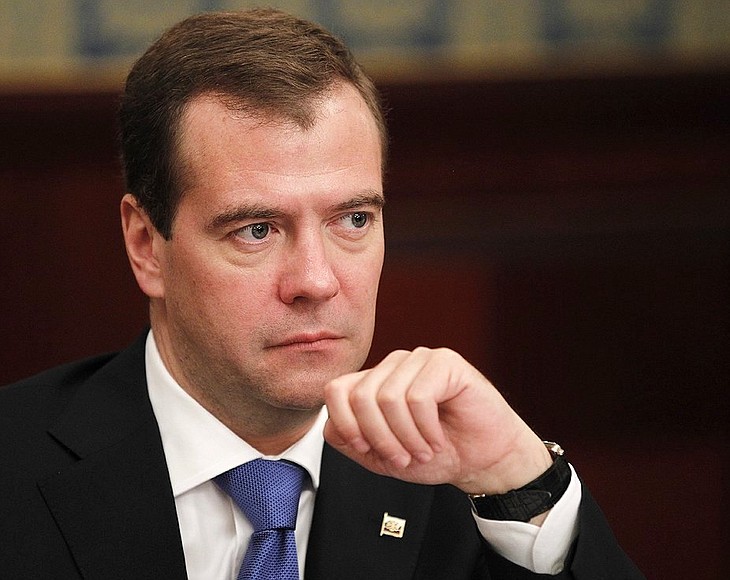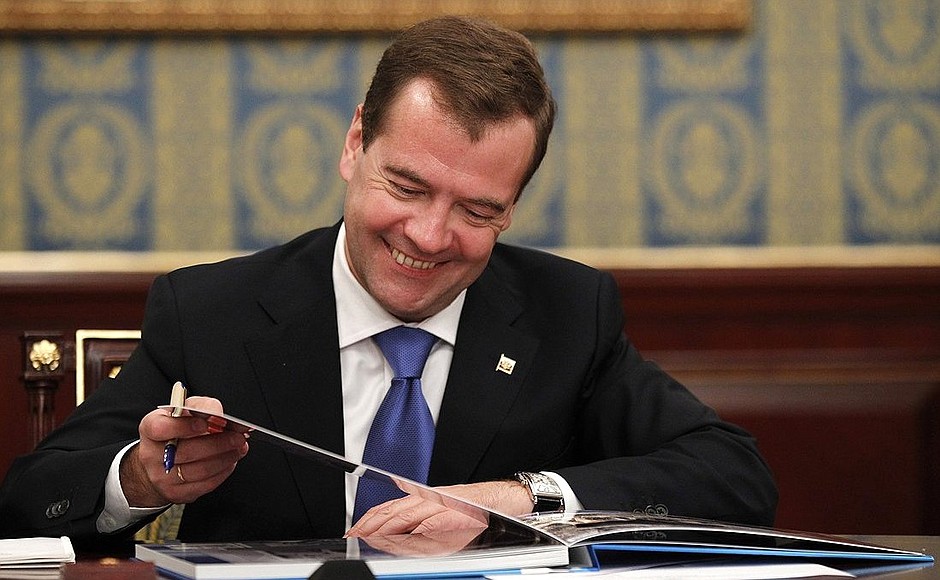In particular, the meeting addressed state regulation of small businesses, the problem of staff shortages, and taxation of small businesses.
* * *
Excerpts from transcript of meeting with Penza Region small business representatives
President of Russia Dmitry Medvedev: Good afternoon,
You wrote to me, and I decided to meet with you personally because the issues that you raised are of concern not just to you, though they are clearly a big preoccupation for you, but are of concern to huge numbers of entrepreneurs and small businesses operating in our country. I would like therefore to hear from you more about the situation here in Penza Region, in the town of Zarechny. Perhaps we might be able to do something about some of the matters you raise as a result of our discussion today.
”I meet quite often with small business representatives. I realise that it is not possible to completely change the business environment in just six months, or a year, or even few years. I think that each meeting of this kind should produce not just instructions but also actual specific action to resolve the problems.“
I make no secret of the fact that I meet quite often with small business representatives. I realise that it is not possible to completely change the business environment in just six months, or a year, or even few years. It is impossible to change attitudes towards business in our country in general so fast, because we have a difficult legacy to deal with in this respect. But at the same time, I think that each meeting of this kind should produce not just instructions but also actual specific action to resolve the problems in cases where I am in a position to be able to change the situation.
* * *
I want to say a few words about different professions’ prestige, above all, the prestige we give workers and their various trades. I ask myself, for example, what can really attract young people to normal, productive and modern trades. I think decorations are the thing least likely to attract them. Of course moral recognition is important. There’s no doubt here. Probably, the older one gets, the more important it is to receive this moral recognition of the work done. But when you’re young still, the prosaic things of life are no less important: money, being able to support your family, get your own home and car, a plot of land where you can go with the family outside of town, a dacha. This is where the discordant notes creep in, because on the one hand we all say that we need workers and that we won’t get anywhere without them, especially skilled workers, but at the same time, they do not earn much. I am not talking about the rarer professions in which there is a shortage of qualified people and people can earn good money, but about the standard trades. Any trade’s prestige will depend above all therefore on its prospects to earn decent recompense. This is one of the fundamental tenets of the market economy. It does not matter how many incentives we create, if workers earn only 5,000 rubles [$180] a month we will not find the people we need. This is thus the most important thing.
This depends a lot on your own will too, on the position taken by employers, whether small business owners, individual entrepreneurs, or industry giants. This is what will generate the flow of young people ready to take up these trades.
I visited the Moscow Region not long ago and spoke with young people studying in vocational colleges and new vocational training institutes. Of course, when the President comes, there is always the danger that the local authorities may polish everything up and get a bunch of people with several university degrees to pretend to be young workers. But speaking seriously, the young people seemed to me motivated and made a good impression.
What motivates them? You are from a small town. You love your Zarechny because you see it as a modern and developing town, not without its problems of course, a recent town. Those young people were from a similar small town in the Moscow Region, home to five or so enterprises, big enterprises by the town’s standards, traditionally working for the defence industry. They said, “You know, we are proud of our town and we don’t want to leave. We know that these companies used to be flourishing, but now they face various difficulties. We want to get the right kind of training, the right vocational skills, so as to come there and continue the work that our grandfathers and fathers began, work at these same companies, but work in a new way. We want decent wages, the chance to buy homes, if not straight away, then by taking out mortgages or going through house-construction cooperatives or some other system, as young qualified professionals”. What they said stayed in my memory because a) they want to work, and b) they are ready to work not as lawyers, economists, bankers and so on, but in the trades, as skilled workers.
What are we to do then? We should do everything we can to encourage the education system, and encourage employers – you, in other words – to develop the opportunities for employing these young people, pay them decent wages and help them settle their social demands. This is the way we can cultivate the new generation of workers we need to replace the old ones.
”What can really attract young people to normal, productive and modern trades. I think decorations are the thing least likely to attract them. Of course moral recognition is important. But when you’re young still, the prosaic things of life are no less important: money, being able to support your family, get your own home and car, a plot of land.“
Employers and the state authorities are currently in the process of examining and drawing up the demands and definitions of various jobs. In some cases we are to change the requirements to working environment. In some cases we merely need to change particular job titles because they have come down to us from the past, but are not always much to the liking of young people today. These are things for the state authorities and business to work on together.
* * *
Finally, one of the themes that traditionally comes up when discussing the prestige of workers, and people in the agricultural sector too, is the way they are portrayed in the media. There are indeed problems here, because if you look objectively, most of our films these days portray people from completely different walks of life. I am not suggesting there is anything wrong with these people. I don’t want to criticise anyone. We do need office workers after all, and let me go even further and say that we need civil servants too, because no country can get by without them. But I completely agree overall that we need films portraying people from all the different walks of life. It’s fine if they portray millionaires, billionaires, but let them portray ordinary people too, ordinary students, schoolchildren, ordinary workers, people running small businesses, because this is all part of our lives.
Many people make a reference out of the examples they see in TV series, soap operas and so on, especially when they are not yet fully mature. To be honest, I am not really sure just what these series are all about because I do not watch them, but I’m sure there are people who grow up on them. This is all something to think about, something for our filmmakers and the TV channels filming these series to think about too. At the same time, we cannot impose anything, because when you start imposing these kinds of things you end up with all kinds of excesses.
Finally, you said that young people these days all want quick success, want to become bankers, go into show business and so on. To be honest, it worries me even more when they say they want to become civil servants. I say this not because I think ill of civil servants, on the contrary, as I just said, civil servants do useful work in any country. But I always think about the motives young people have when choosing their future professions. Of course, 20–30 years ago, people wanted to become designers, cosmonauts, actors, because these were popular and interesting professions, prestigious and well-paid. Such professions exist today too. But when young people say they want to become civil servants, I cannot help but wonder why.
Is it prestigious to be a civil servant? Not hugely, not superficially, anyway. I’m not talking about being a minister or something, but just a rank and file civil servant. Do they get good pay? No, they are not paid well. So, what is the motivation? It’s because they see in it a way to get rich quick – the opportunity for corruption. In other words, it offers the prospect of rapid success without having to put in the hard work.
You are absolutely right in this sense. After all, you worked one, or two, or three decades, earning your money cent by cent, building up your businesses to achieve success. But some people out there have a different set of references mapped out, want to get some low-level civil servant’s job, take, say, five or so bribes offered, and then leave it at that, or open their own business perhaps. Although, as a rule, things never stop there, and it soon becomes a way of life that continues until they are either caught or exit the system for whatever other reason. This really is very worrying, but this is another matter.
* * *
When I worked in the Government, and last year too with the drought, I met quite often with people from the agriculture sector. Whether in crop-growing or livestock, they almost always said, “We are going to set the rules of the game now and defend our interests, working through our self-regulated organisations”.
”I think that we have taken at least one big positive step though recently by creating the Customs Union between Russia, Belarus, and Kazakhstan, and I place high hopes on this project. It is quite simply a big economic entity. But the main thing is that we are bringing our customs standards up to European levels.“
This has created a corporate spirit when everyone is aware that, although they are all competitors, given that this is business, not charity, at the same time, they have to be able to unite in some situations, otherwise they would face being torn to pieces. Small businesses would get eaten by big ones, and in some cases, foreign business could come in and swallow everyone. You all know yourselves that everyone has their own problems. And so I can only welcome your plans to establish self-regulating organisations. This fits in with our state policy. We want state regulation to give way to active efforts by self-regulating organisations. It is not possible to do this in every sector. We are realists of course.
In some cases the state authorities have to set norms and regulations, and even intervene directly, but in general, this kind of self-regulation is the civilised way of doing things. We see this all around the world, and you know this well, because you follow foreign practice and see that small companies and firms unite. This way, they make sure that their voice gets heard, and that the big companies, the authorities, and the various competitors take notice of them.We are to change people’s attitudes to business. It’s been 20 years that we have lived in the new economy you would think, but the stereotypes remain. If someone was a hired worker yesterday, and earns modest money today as an entrepreneur, they’re immediately pictured as someone squeezing the very lifeblood out of their unfortunate workers. But we know that this is not the case in reality. We should talk about this and even set up a programme to promote entrepreneurship as something that huge numbers of people can take up. Our goal is to have around 30–40 percent of the population become entrepreneurs, perhaps even more.
* * *
On the subject of replacing imports, we do have such a programme, but it has not been very effective so far. This is because it is impossible to impose anything in a present-day market economy. It is possible to some extent with public procurement, defence-related purchases, for example, but even then only with a lot of difficulty. Even in the case of developing new models of military equipment, say, you cannot force companies these days to buy this or that particular item, because they will say, “It doesn’t deliver the quality I need, and so I want to buy it abroad, and it will work a lot better”.
But we do have programmes for replacing imports. They are necessary and should even be extended, because we risk eroding the whole foundation of our industry otherwise. We had a good industrial base, not without its flaws of course, and we shouldn’t idealise it, but we did have this foundation.
I can tell you that with some countries we have future plans based on selling them our machine-building industry’s goods. It is very important for us to keep hold of particular markets, build machine tools and develop new installations, new systems, produce them here at our facilities, and sell them to these countries. We have this kind of cooperation with China, which is a huge consumer, with Vietnam, and a number of other Asian countries. Of course, it is harder to break into the Western markets because of the high level of competition there.
* * *
The Customs Service is a very complex organisation, and the various attempts to improve it over the last years have not always been very successful, to be honest. I am not suggesting that all customs officers are swindlers, of course not, or that the system cannot be reformed and should be abolished, which is impossible. After all, customs is an important trade policy instrument in any country.
I see only one real solution for the customs service, and for many other areas of state administration, and that is to move over to electronic service, when the demands are clear, when you see clearly which services you need or don't need, fill out the necessary forms, send them off, pay the fees if they exist, and that’s it.
I know people who used to work in customs. I won’t comment, but the reality is that there is still much to be put in order there. Of course we are to give the service a shakeup. I think that we have taken at least one big positive step though recently by creating the Customs Union between Russia, Belarus, and Kazakhstan, and I place high hopes on this project.
First, it is quite simply a big economic entity. You as businesspeople know that bigger markets are always a good thing. But the main thing is that we are bringing our customs standards up to European levels. So, whether they want it or not, they are going to have to make their work more transparent and be more attentive to the needs of businesspeople and the ordinary people who cross customs. This is also a big subject of course.
* * *
”We are to change people’s attitudes to business. It’s been 20 years that we have lived in the new economy you would think, but the stereotypes remain. We should set up a programme to promote entrepreneurship as something that huge numbers of people can take up. Our goal is to have around 30–40 percent of the population become entrepreneurs, perhaps even more.“
I met just two days ago with representatives of our major companies, and they said essentially the same things as you now. We are to change people’s attitudes to business. It’s been 20 years that we have lived in the new economy you would think, but the stereotypes remain. If someone was a hired worker yesterday, and earns modest money today as an entrepreneur, they’re immediately pictured as someone squeezing the very lifeblood out of their unfortunate workers. But we know that this is not the case in reality. We should talk about this and even set up a programme to promote entrepreneurship as something that huge numbers of people can take up.
Our goal is to have around 30–40 percent of the population become entrepreneurs, perhaps even more. Let me emphasise this figure. We must get people into small business. This kind of business is small indeed in Russia for now, but we want to build it up to the levels it has in the big developed countries. If we set this goal of getting 30, 40, or 50 percent of our people into entrepreneurship we have to explain to them what it is about, what the problems are, and what advantages it offers. We need to promote this just as much as we need to promote the workers with their trades. All of this work is worthy of respect. I think this is something you yourselves should be doing. Do you agree?
* * *
Summing up this meeting, I found it interesting, because each of you has your own road in business, but at the same time, you all share common problems. Of course you know that many of the problems you face affect other businesspeople in our country too. We will try to resolve them. I cannot promise that this will happen overnight, but when I look back at the not so distant past, I see that despite all the difficulties, the civil servants we are all fed up with, the bribes, and all the other problems, the business climate has nonetheless improved, even if you have perhaps still encountered problems on your individual paths.
We will continue to pursue this improvement. I will, at any rate, because I believe that our country has neither civilized nor uncivilized future without entrepreneurs.
I want to say one final thing, and that is that you do have a lovely town. Thank you for inviting me. I will think about when and how to organise a visit. I hope you will continue to love your town as much as you have told me you do, and will keep doing all you can to make it beautiful, modern and flourishing. Thank you.
